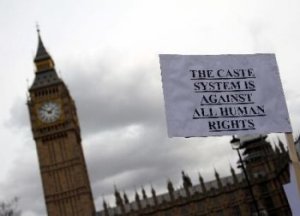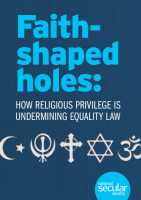Bigotry based on the idea of 'caste' has no place in modern Britain.
We want to see those at risk of caste discrimination protected by UK law.
'Caste' systems are rooted in ancient religious and cultural beliefs. They are imbued with inequality and discrimination, and are wholly incompatible with human rights.
There are an estimated 50,000 – 200,000 people in the UK who are regarded by some as 'low caste' (sometimes known as 'dalits') and at risk of caste discrimination. There is evidence of caste-based discrimination and harassment present in employment, education and in the provision of services.
Caste-based prejudice and discrimination is a gross violation of human rights and must not be tolerated. All individuals have the right to protection against discrimination on the basis of their caste or perceived caste, in the same way that they do on the basis of race or gender
Our equality laws do not explicitly deal with the issue of caste, meaning victims of caste discrimination have to use unclear and precarious case law to secure justice. Both parliament and the United Nation Human Rights Council have called on the government to explicitly outlaw caste-based discrimination, but it has delayed doing so for years.
It's time to outlaw caste discrimination.
Take action!
1. Have you experienced caste discrimination? Report it!
The Dalit Solidarity Network's "everyday casteism" campaign is cataloguing instances of casteist behaviour, including incidents of discriminatory or caste hate speech behaviour, experienced on a day to day basis by people perceived to be 'lower' caste in the UK.
If you have been affected by caste discrimination, please consider reporting it to them.
You can also report caste discrimination to the Anti Caste Discrimination Alliance here.
2. Write to your MP
Tell your MP that it's time to outlaw caste discrimination.
3. Join the National Secular Society
Become a member of the National Secular Society today! Together, we can separate religion and state for greater freedom and fairness.
Latest updates
NSS: government decision on caste discrimination shows "callous disregard for victims"
Posted: Mon, 23 Jul 2018 11:30
The National Secular Society has accused the government of showing "callous disregard for victims" after it announced it would not explicitly recognise caste-based discrimination under equality legislation.
In its response to a public consultation, the Government Equalities Office said it would rely instead on 'emerging case-law as developed by courts and tribunals' to tackle the issue.
In justifying the decision, the government described legislating for caste as an "exceptionally controversial issue" and "deeply divisive within certain groups".
NSS president Keith Porteous Wood strongly criticised the decision.
"Choosing not to recognise caste-based discrimination under equality legislation demonstrates a callous disregard for victims.
"Legislation outlawing caste discrimination is the only way to provide legal protection at a reasonable cost. Case law remedies are uncertain and ruinously expensive as has already been demonstrated in the courts, where no one has yet succeeded in making a case.
"Victims being left with no legal protection is the most likely outcome of this decision, which could not be more at odds with Prime Minister May's commitment to help those disadvantage by their background.
"The government clearly feels under pressure not to upset 'high caste' Hindus, both in the UK and India. But the decision flies in the face of repeated pleas from the United Nations and there may yet be legal means to challenge it."
Dawn Butler MP, Labour's shadow minister for women and equalities, also expressed her disappointment at the decision.
"It is very disappointing that the government has performed a U-turn on the decision to bring caste discrimination under equality law," she said.
"Caste-based prejudice and discrimination is a gross violation of human rights and must not be tolerated. All individuals have the right to protection against discrimination on the basis of their caste or perceived caste, in the same way that they do on the basis of race or gender."
Research has estimated that at least 50,000 (and perhaps in excess of 200,000) people living in the UK are regarded by some as 'low caste' and at risk of caste discrimination. The research found evidence of caste-based discrimination, harassment and bullying present in employment, education and in the provision of services.
Between March and September 2017 the government's equalities office consulted on whether legal protection for victims of caste-based discrimination could best be protected through developing case law (where caste can be seen as an aspect of ethnicity) or by outlawing caste through the Equality Act 2010.
A provision in the act that enabled secondary legislation to be passed by a ministerial order was replaced in 2013 by an instruction by parliament to the government to outlaw such discrimination. Following this consultation, the government proposes to repeal these provisions.
Over half of the respondents to the consultation were 'in favour of relying on case-law'. Over 20% rejected both options, which the government considered as a call to "introduce new legislation that would prevent the possibility of caste being a legal concept in domestic law". The government rejects this position.
In its response the government said it considered it "likely that anyone who believes that they have been discriminated against because of caste could bring a race discrimination claim under the existing ethnic origins provisions in the Equality Act 2010".
It argues that there is no universally accepted definition of caste, and so "case-law can be more flexible and allows the concept of caste to be developed and refined over time" – but only in cases where a claimant can show that their caste is related to their ethnic origin, religion or belief.
Meena Varma, Director of Dalit Solidarity Network UK, was shortlisted for the 2018 Secularist of the Year award for her work tackling caste based discrimination. Speaking at the event earlier this year, she said: "Caste discrimination is a human rights issue and can only be addressed when it is seen through a lens separate to religion and when the rich and powerful are not the only ones to have the ear of governments."
Charity Commission to investigate Hindu group over ‘extremist’ speaker
Posted: Tue, 31 Oct 2017 14:48
The Charity Commission is to investigate a Hindu organisation after it invited a controversial Hindu nationalist to a House of Commons event.
Southall Black Sisters and the Women Against Radicalisation Network are among those calling for National Hindu Council of Temples (NHCT) to lose their charitable status over their promotion of Tapan Ghosh.
The open letter to the Charity Commission, also supported by the Association of British Muslims and the Asian Mums Network, criticised the NCHT for inviting Tapan Ghosh to speak in Parliament, saying the event was aimed at "stirring up religious hatred in Britain" and that the organisation "should be stripped of its charity status".
Mr Ghosh appeared at event in Parliament on 18 October, hosted by the NHCT and Conservative MP Bob Blackman, called "Tolerating the Intolerant". According to the Times, Mr Ghosh was the keynote speaker and talked about his West Bengal based Hindu Samhati, referred to by some as a "Hindu Defence Force". Such groups have been implicated in violence against Muslim minorities, including rising mob violence against those eating or accused of eating beef.
The National Secular Society welcomed the investigation, warning that Hindu Nationalism or Hindutva was a "divisive far-right religio-political ideology, akin to Islamism".
Mr Gosh is on record calling on the United Nations to control the birth rate of Muslims and has previously been accused of promoting anti-Muslim conspiracies, praising the genocide of Rohingya Muslims in in Burma, and calling for Muslims to be forced to convert if moving to a western country. He has also tweeted that "All Muslims are jihadis". Mr Gosh and the NHCT have been accused of developing links with other far right nationalist movements, and last week Mr Gosh took part in an interview with former EDL leader Tommy Robinson.
Mr Blackman defended Ghosh's appearance to BBC News last week, saying that Mr Ghosh's talk had not focused on anti-Muslim issues, and that he did not regret sharing a platform with him.
The National Council of Hindu Temples has been investigated by the Charity Commission before for appearing to endorse the Conservative Party in the 2015 and 2017 general elections. In both cases perceived Labour support for outlawing caste discrimination was seen as a significant factor. Bob Blackman, the MP for Harrow East, is chair of the All Party Parliamentary Group for British Hindus and a vocal campaigner against efforts to outlaw discrimination based on the idea of caste.
A spokesperson for the NSS commented: "Many faith-based charities carry out good work, but it is unclear why some groups receive charitable benefits merely for the promotion of religion, especially when they are also involved in partisan politics and the spread of sectarian hatred."
Image is a YouTube still from one of the events, with Tapan Ghosh centre and Bob Blackman MP on the right.
Discuss this on Facebook.




